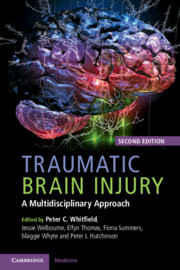Book contents
- Traumatic Brain Injury
- Traumatic Brain Injury
- Copyright page
- Contents
- Contributors
- Foreword to First Edition
- Foreword to Second Edition
- Chapter 1 Epidemiology of Head Injury
- Chapter 2 The Neuropathology of Traumatic Brain Injury
- Chapter 3 Experimental Models of Traumatic Brain Injury
- Chapter 4 Clinical Assessment of the Head-Injured Patient
- Chapter 5 Neuroimaging in Trauma
- Chapter 6 Scoring Systems for Trauma and Head Injury
- Chapter 7 Early Phase Care of Patients with Mild and Minor Head Injury
- Chapter 8 Early Phase Care of Patients with Moderate and Severe Head Injury
- Chapter 9 Interhospital Transfer of Brain-Injured Patients
- Chapter 10 Principles of Head Injury Intensive Care Management
- Chapter 11 Intracranial Pressure Monitoring in Head Injury
- Chapter 12 Multimodality Monitoring in Head Injury
- Chapter 13 Therapeutic Options in Neurocritical Care
- Chapter 14 Therapeutic Options in Neurocritical Care
- Chapter 15 Brain Stem Death and Organ Donation
- Chapter 16 Anaesthesia for Emergency Neurosurgery
- Chapter 17 Surgical Issues in the Management of Head-Injured Patients
- Chapter 18 Craniofacial Trauma
- Chapter 19 Cranioplasty after Head Injury
- Chapter 20 Neurosurgical Complications of Head Injury
- Chapter 21 Paediatric Head Injury Management
- Chapter 22 Assessment of Cognition and Capacity
- Chapter 23 Families
- Chapter 24 Principles of Rehabilitation
- Chapter 25 MDT and Rehabilitation of Head Injury
- Chapter 26 Neuropsychological Rehabilitation
- Chapter 27 Assistive Technology and Rehabilitation
- Chapter 28 Outcomes and Prognosis
- Chapter 29 Medicolegal Aspects of Traumatic Brain and Cervical Spine Injury
- Index
- References
Chapter 24 - Principles of Rehabilitation
Published online by Cambridge University Press: 28 April 2020
- Traumatic Brain Injury
- Traumatic Brain Injury
- Copyright page
- Contents
- Contributors
- Foreword to First Edition
- Foreword to Second Edition
- Chapter 1 Epidemiology of Head Injury
- Chapter 2 The Neuropathology of Traumatic Brain Injury
- Chapter 3 Experimental Models of Traumatic Brain Injury
- Chapter 4 Clinical Assessment of the Head-Injured Patient
- Chapter 5 Neuroimaging in Trauma
- Chapter 6 Scoring Systems for Trauma and Head Injury
- Chapter 7 Early Phase Care of Patients with Mild and Minor Head Injury
- Chapter 8 Early Phase Care of Patients with Moderate and Severe Head Injury
- Chapter 9 Interhospital Transfer of Brain-Injured Patients
- Chapter 10 Principles of Head Injury Intensive Care Management
- Chapter 11 Intracranial Pressure Monitoring in Head Injury
- Chapter 12 Multimodality Monitoring in Head Injury
- Chapter 13 Therapeutic Options in Neurocritical Care
- Chapter 14 Therapeutic Options in Neurocritical Care
- Chapter 15 Brain Stem Death and Organ Donation
- Chapter 16 Anaesthesia for Emergency Neurosurgery
- Chapter 17 Surgical Issues in the Management of Head-Injured Patients
- Chapter 18 Craniofacial Trauma
- Chapter 19 Cranioplasty after Head Injury
- Chapter 20 Neurosurgical Complications of Head Injury
- Chapter 21 Paediatric Head Injury Management
- Chapter 22 Assessment of Cognition and Capacity
- Chapter 23 Families
- Chapter 24 Principles of Rehabilitation
- Chapter 25 MDT and Rehabilitation of Head Injury
- Chapter 26 Neuropsychological Rehabilitation
- Chapter 27 Assistive Technology and Rehabilitation
- Chapter 28 Outcomes and Prognosis
- Chapter 29 Medicolegal Aspects of Traumatic Brain and Cervical Spine Injury
- Index
- References
Summary
Rehabilitation has been defined in many ways, but in the broadest sense is concerned with maximising quality of life after injury or illness.1 More specifically, rehabilitation is about maximising the ability and opportunity of the person with brain injury to participate in those activities of daily living, work, education, leisure and relationships that are valued by that person. Wade discusses the importance of models of illness (and health) and highlights the value of the World Health Organization International Classification of Functioning, Disability and Health (ICF) as a framework for understanding the process of rehabilitation.
- Type
- Chapter
- Information
- Traumatic Brain InjuryA Multidisciplinary Approach, pp. 301 - 307Publisher: Cambridge University PressPrint publication year: 2020

